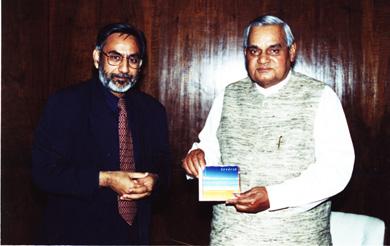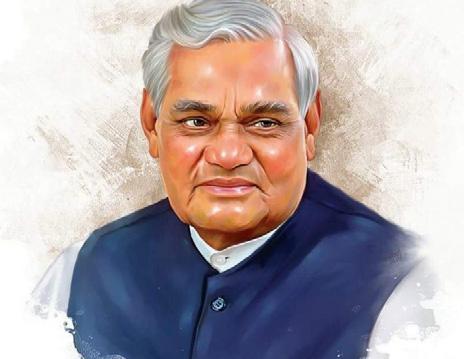
3 minute read
A moderate among hardliners
from 2018-09 Brisbane
by Indian Link
A tribute to India’s former Prime Minister Atal Bihari Vajpayee
He was a man of moderation in a fraternity of jingoistic nationalists; a peace visionary in a region driven by religious animosity; and a man who believed in India’s destiny and was ready to fight for it.
Former Prime Minister Atal Bihari Vajpayee (93), who died on 16 August, will go down in history as a person who tried to end years of hostility with Pakistan and put development on the front burner of the country’s political agenda. He was also the first non-Congress Prime Minister to complete a full five-year term.
In his tumultuous tenure, Vajpayee made India a declared nuclear state and then almost went to war with Pakistan before making peace with it in the most dramatic fashion. In the process, his popularity came to match that of Indira Gandhi, a woman he admired for her guts even as he hated her politics. He became PM, but only for 13 days, from May 16-28, 1996, after his deputy, LK Advani, chose not to contest elections that year. His second term came on March 19, 1998, and lasted 13 months, during which India stunned the world by undertaking a series of nuclear tests that invited global reproach and sanctions.
Although his tenure again proved shortlived, his and his government’s enhanced stature following the world-defying blasts enabled him to return as Prime Minister for the third time on October 13, 1999, a tenure that lasted a full five-year term.
He finally stepped down in May 2004, after losing the election. The BJP’s election strategy rested on seeking a renewed mandate over three broad pillars of achievement that the government claimed – political stability in spite of a multi-party coalition; a “shining” economy that saw a dizzying 10.4 percent growth in the last quarter of the previous year; and peace with Pakistan.
Vajpayee was born on Christmas Day in 1924 in Gwalior, Madhya Pradesh. After a Masters in Political Science, he worked as a journalist with Hindi publications such as Rashtradharma, Panchjanya, and two Hindi dailies, Swadesh and Veer Arjun. By then he had firmly embraced the ideals of the Hindu nationalist Rashtriya Swayamsewak Sangh (RSS).
But even as he struggled to win electoral battles, his command over Hindi, his conciliatory politics and riveting oratory brought him into public limelight.
His first entry into Parliament was in 1962 through the Rajya Sabha, and in 1971, he won a Lok Sabha election. Vajpayee spent months in prison when Indira Gandhi imposed Emergency rule in June 1975 and put her political opponents in jail. When the Janata Party took office in 1977, dethroning the Congress for the first time, he became the foreign minister.
The lowest point in his career came when he lost the 1984 Lok Sabha polls, that too from his birthplace Gwalior, after Rajiv Gandhi won an overwhelming majority following his mother Indira Gandhi’s assassination. In no time, Vajpayee was replaced and “eclipsed” by his long-time friend LK Advani.
Although they were the best of friends publicly, Vajpayee never fully agreed with Advani’s and the assorted Hindu nationalist groups’ strident advocacy of Hindutva, an ideology ranged against the idea of secular India. He was often described as the right man in the wrong party. Often he found his convictions and value systems at odds with the party, but the bachelor-politician never went against it.

It was precisely this persona of Vajpayee — one merged in Hindutva ideology yet seemingly not wholly willing to bow to it — that won him admirers across the political spectrum. It was this trait that made him the Prime Minister when the BJP’s allies concluded they needed a moderate to steer a hardliner, pro-Hindu party.
Vajpayee’s diplomatic initiative to start a bus service between New Delhi and Pakistan’s Lahore city was lauded, although it was suspended after the 2001 terror attack on the Indian Parliament. The freeze was cracked in 2003 when Vajpayee, while in Kashmir, extended a “hand of friendship” to Pakistan, which led to the historic summit in January 2004 with then President Pervez Musharraf in Islamabad — a remarkable U-turn after the failed summit in Agra of 2001. Despite the two men being so far apart in every way, Musharraf developed a strong liking for the Indian leader.
He was not known as “Atal-Ji”, a name that translates into firmness, for nothing. He could go against the grain of his party if he saw it deviate from its path. When Hindu hardliners celebrated the destruction of the 16th century Babri Mosque at Ayodhya, he was full of personal remorse and called it the “worst miscalculation” and a “misadventure”.








